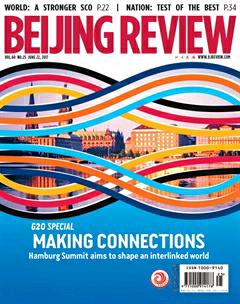Looking East
By+Dominic+James+Madar
For millennia, Chinese society, one of Earths greatest and most advanced, subsisted just fine on its own set of values. Chinese political philosophy is rooted in the ancient teachings of Confucius. A key tenet of this is filial piety. The greater wisdom is possessed by those older and more experienced. This clashes with the key Western value of individual empowerment. Chinas moral conviction comes from Confucianism and the collective system.
The Chinese narrative in the past was one of a mighty civilization brought to its knees by foreign powers. After prolonged turmoil and upheaval, the contemporary period of stability is not taken for granted. As a famous saying goes, the Chinese fear chaos above all else.
Inner strength is the best way to deter external aggression. Military, economic, political and cultural leverage are key to bettering ones standing in this great game of global survival. To be weak is to be vulnerable. The Chinese advocate a multipolar world in which great powers are checked by one another to prevent any single state from worldwide domination. Beijing acknowledges American hegemony in the current unipolar order and views Washingtons involvement in the South China Sea dispute and the Trans-Pacifi c Partnership as efforts to contain China.
According to structural realists, the United States, as the established power, would naturally seek to protect its global preeminence from China, the rising power.
And China is rising. President Xi Jinping projects gravitas and calm authority. His anti-corruption drive may be born of a desire to mold a better image of the Communist Party of China, both domestically and internationally. It may also be for economic reasons: to incentivize business and cut excessive state expenses. It may even come from the personal conviction of the man responsible for more people on Earth than any other.
Internationally, China is ready to reclaim its place at the summit of the global economy. Barring a financial collapse, China will be the worlds largest economy within a decade. That is unlikely to translate into economic hegemony considering the IMF, World Bank and WTO were built and are led by the United States. However, the China-proposed ambitious Belt and Road Initiative, underpinned by capacity cooperation and the newly formed Asian Infrastructure Investment Bank, signals a break from an almost exclusively U.S.-led fi nancial world. Capacity cooperation has the potential, with China at its heart, to reignite the stuttering global economy. After all, the nation has been responsible for over a quarter of global growth since the fi nancial crisis of 2008.
Chinas very presence—its rapid development and colossal scale—makes it a headache for international liberalism.
What happened to Francis Fukuyamas endlessly referenced “end of history?” The collapse of the Soviet Union was supposed to herald a new global age of enlightenment, of “democracy and freedom” for everyone. Maybe those halcyon days in the early 1990s were a Western illusion in which the U.S. stood unopposed as the shining city upon the hill. Two-and-a-half decades later, rapacious neoliberalism and corrosive nation building have dragged us back to the real world.
Brexit and the spread of populism across Europe indicate the West is turning inward, toward protectionism and isolationism. It is China more than any other country that is promoting internationalism, not on the Wests terms of “democracy and freedom,”but through economic cooperation, development and diplomacy. China is now set to lead the way on climate change too, given Trumps refusal to accept that humans are largely responsible for the planets accelerating destruction.
Confi dence in the United States, both internal and external, is decaying. Its messy presidential election, calamitous foreign policy record and chronic economic weaknesses exposed by the 2008 fi nancial crisis have shredded its credibility as the de facto global leader, and liberalism is in fullblown crisis. As the U.S. becomes increasingly unfi t to serve as the lone superpower, we must look east to broaden our inspiration in this increasingly multipolar world.

